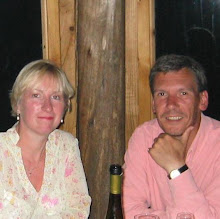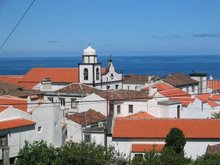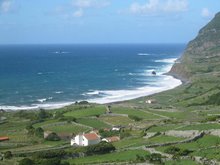Today, the 25th April 2011, is not just Easter Monday in Portugal but also the country's national day, Dia da Liberdade.
This celebrates the date in 1974 when the Salazar-Caetano right wing dictatorship (the Portuguese equivalent of General Franco in Spain) which had ruled since 1926 was overthrown in the so called Carnation Revolution.
The background to the revolution (as if having a right wing dictatorship were not reason enough) was the fact that, whilst Britain and France had done the decent thing and let their colonial empires go in the 1950s and 60s, Portugal was still grimly clinging on to its - principally Mozambique and Angola but one or two other godforsaken spots in darkest Africa as well - in the 1970s and fighting a bitter colonial war. In 1974, a group of lefty military officers wondered why on earth they were bothering and decided to stage a coup de etat.
According to Wikipedia, the signal to the armed forces to revolt was the broadcasting on the radio of two particular songs: that year's entry to the Eurovision Song Contest (Portugal nul points) and a track by one Zeca Afonso, described by WP as "a progressive folk singer forbidden on Portuguese radio at the time". And I should think so too. Can you imagine anything more worthy of repression than a "progressive folk singer"? And anything the unleashing of which would be more likely to bring the citizenry out in protest?
That's not Zeca Afonso but somebody who came up when I googled "progressive folk singer" and it sort of proves my point. It also reminds me that, during the Waco siege in 1993, the Feds played "Achy Breaky Heart" 24/7 in an attempt to sap the morale of Koresh and co.
Well the combination of Eurovision and prog-folk on the radio did the trick in Lisbon in 1974 and brought an enraged populace on to the streets begging for mercy and sticking carnations up the nostrils of anyone looking even remotely like a folk singer (progressive or otherwise). Uma Canção para Europa contestants were maltreated with the sharp ends of gladiolus stems and in the confusion the dictator, Marcelo Caetano, fled to Brazil without a shot being fired.
Meanwhile, back in 2011, I experienced at first hand how the Portuguese reconcile the conflict between Easter Monday and Dia da Liberdade. I wonder, en passant (he says slipping seamlessly from Portuguese into French, and drawing on that small stock of mots justes with which it's so de rigueur to be au fait) if Dia da Liberdade has ever fallen on Easter Monday before? Is it one of these coincidences that will never again happen in my lifetime and next occur in the year 3492 along with Halley's Comet ...
But I digress, where was I? Oh yes, in the shop this morning and I asked why no bolos levedos (buns similar to soda scones which are awfully good with butter and jam for afternoon tea) for sale. Linda said it was because of the holiday and I said "Oh of course, it's Easter Monday". And she replied "No it's Dia da Liberdade."
Take from that what you will. But before I even went into to the shop I'd noticed it was a day of the year more momentous than either - the day when the annual Olá flag goes up outside the shop. Each year it gets knocked off by a big lorry going down the road and each year, round about now, it is faithfully replaced. Summer may now officially commence.
Subscribe to:
Post Comments (Atom)









5 comments:
Zeca was a genious, huge, huge man.
So true, Marisa! In the process of explicating a poem in Vasco Pereira da Costa's "My Californian Friends" as part of my talk at a conference I'm attending in Paris next month, I discovered that a couple lines in one of his poems quote from Zeca's song "Canção Longe" -- as homage!
At the risk of shamelessly self-promoting -- as though THAT has ever stopped me before! -- there's more info in English re the Carnation Revolution at:
http://www.inolongerlikechocolates.com/april-25.htm
À propos of the subject at hand, did you know that the signal to start the Carnation Revolution was just after midnight on 25 April 1974, when Rádio Renascença would play Zeca's "Grândola, Vila Morena"?
See minute-by-minute timeline of 25 April:
http://en.wikipedia.org/wiki/Timeline_of_the_Carnation_Revolution
Read more (in Portuguese, by my esteemed colleague Dr. Eduardo Mayone Dias, Emeritus of UCLA, whose "A Presença Portuguesa na Califórnia" I co-translated, pub. 2009):
http://www.portuguesetimes.com/Ed_1870/Cronicas/cartadecalif.htm
View a music video compilation of iconic images from 25 April:
http://www.youtube.com/watch?v=3wAAEOsphso
You can also read an oral history interview (in English) granted by Colonel Vítor Alves (who just died this January), one of the leaders of 25 April on the occasion of its 30th anniversary, when he was visiting the University of California-Berkeley for a celebration of the Carnation Revolution:
http://digitalassets.lib.berkeley.edu/roho/ucb/text/alves_vitor.pdf
Additional historical trivium:
When strongman Manuel Noriega was holed up in Panama and the US wanted to flush him out in order to capture him, they took advantage of intel that he was a classical music lover -- so blared Van Halen rock over the loudspeakers outside his digs for 10 days, which succeeded in breaking his spirit. Coincidentally, this was just a clue on "Jeopardy!" this week, else I'd never have known which rocker it was!
WoW! what a way to celebrate. Flower on a gun. That is really awesome.
Post a Comment